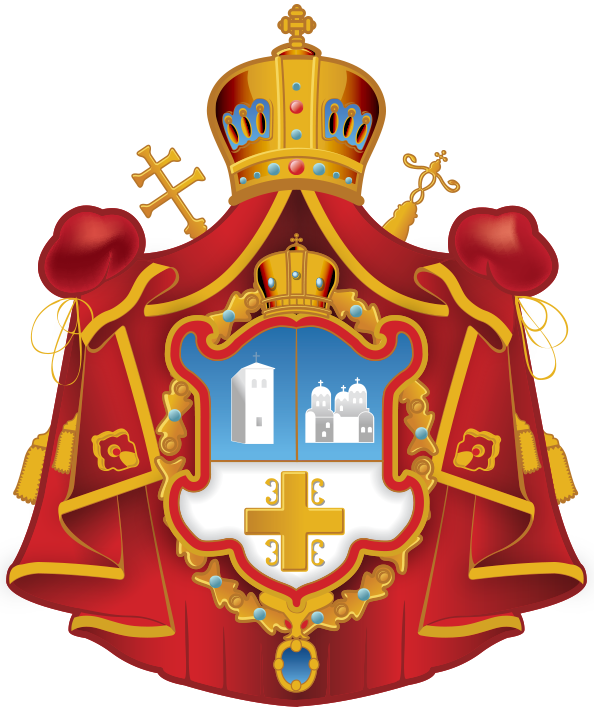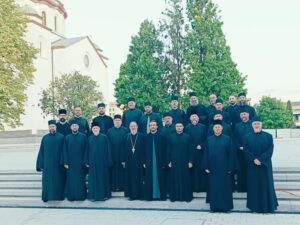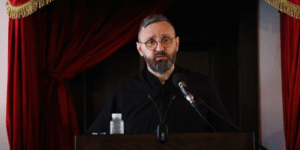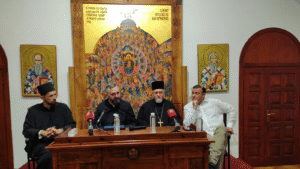We continue with verses 3 and 4, in which the Apostle Matthew describes the first temptation by the devil:
And the tempter came to Him and said, “If You are the Son of God, command that these stones become loaves of bread.” But He answered and said, “It is written: Man shall not live by bread alone, but by every word that proceeds from the mouth of God.”
The Holy Fathers interpret these verses from several perspectives. Saint John Chrysostom draws attention to the internal state of the devil himself, who was in complete uncertainty regarding the identity of Jesus of Nazareth. Saint John writes:
“After he had already heard the voice from heaven bearing witness, ‘This is My beloved Son’ (Mt. 3:17), and had listened to the glorious testimony of John concerning Jesus, the tempter suddenly sees Him hungry, and this brings him into confusion. Recalling all that was said about Jesus, the devil cannot believe that He is merely a man; yet, upon seeing Him hungry, he cannot accept that He is the Son of God. In such uncertainty, the devil approaches Christ with words of doubt. Just as he once approached Adam, fabricating something that did not exist in order to learn the truth, so now, failing to comprehend the ineffable mystery of the Incarnation and the One standing before him, he cunningly weaves new nets in order to discover what remains hidden and unknown. What does the devil say? ‘If You are the Son of God, command that these stones become bread.’ He does not say, ‘if You are hungry,’ but rather, ‘if You are the Son of God,’ intending to deceive Him with flattery… Behold the cunning of the evil one and the way he begins his assault—how faithful he remains to his own corruption: with the same means by which he cast the first man out of paradise and subjected him to countless afflictions, he begins his deception here again—namely, with the lack of restraint regarding food… Christ responded with words from the Old Testament: ‘Man shall not live by bread alone.’ These words mean that God can feed the hungry even by His word. By this, Christ teaches us that, regardless of hunger or any other suffering, we must never turn away from the Lord.”
Saint Nikolaj of Ohrid presents his own view of this suggestion to turn stones into bread. He writes:
“It is evident even from the devil’s words that he seeks to mock God—as if to say: Behold God’s power and God’s love for mankind! A rocky and desperate desert on every side. Not a single piece of bread for a hungry man. God has created man and placed him in a breadless wilderness to suffer hunger and die from starvation. Where then is divine power, where is love, where is God’s mercy? Therefore, if You truly are the Son of God and if You are able, turn this God-made stone into bread and eat. But if God has not given You this power, then why remain faithful to Him? Come, join me in opposing God!”
This is complemented by the words of Saint Athanasius the Great, who states:
“After every statement, the devil continually adds: ‘If You are the Son of God’—that is, if the voice that called You the Son was true, then why not confirm it by doing what I suggest?”
The Holy Fathers discern in Christ’s conduct matters of great importance for our spiritual life. Saint Gregory the Dialogist draws attention to how we ought to respond to insults:
“The Lord, being tempted by the devil, replies with the commandments of Holy Scripture. He Who is the very Word, Who could have cast His tempter into the abyss, did not display His power, but rather offered only counsel from Scripture. In doing so, He gives us an example of His forbearance, so that when we endure suffering from godless men, we might be more inclined to draw instruction for ourselves rather than seek revenge. Observe the patience of God and compare it with our own impatience. When we are offended or injured in any way, we, driven by madness, either avenge ourselves to the extent that we are able or threaten vengeance if we cannot act. On the other hand, the Lord endured insult from the devil and responded with nothing but words of meekness. He bore the one whom He could have punished, so that His glory might be even more exalted by the fact that He overcame His enemy not by destruction, but by patience.”
Saint John Chrysostom emphasizes a very important point:
“Since the first man, by obeying the devil, provoked the wrath of God and transgressed the law, the Lord instructs you in every possible way not to obey the devil—even when what he proposes does not appear to be a transgression of the law. And what do I say—transgression? Even if demons offer advice that seems useful, the Lord forbids us from listening to them. Thus, the Lord commanded demons to be silent, even when they were proclaiming that He is the Son of God.”
To this we may add that today there exists an unhealthy fascination with the testimonies of the possessed. Some people seek confirmation from the mouths of demons regarding the imminent end of the world, the truth of Orthodoxy, or what happens after death—whether through videos on YouTube or written content across the internet. But we see what the Holy Fathers teach regarding this matter: they categorically forbid any contact or engagement with such content.
Saint Cyril of Alexandria further observes that the devil sought to awaken vanity in Christ by proposing that He work a miracle. Knowing this, Christ did not listen to him. For the same reason, the Lord did not yield to the Pharisees when they demanded a sign from Him (cf. Mt. 12:38). Saint Cyril counsels that we should adopt a similar attitude toward unbelievers and those who seek to tempt us—that we should not give place to vanity, even under the guise of noble suggestion.
Verses 5 and 6 read as follows:
Then the devil took Him into the holy city and set Him on the pinnacle of the temple. And he said to Him, “If You are the Son of God, throw Yourself down. For it is written: ‘He shall give His angels charge over You,’ and, ‘In their hands they shall bear You up, lest You dash Your foot against a stone.’”
The Holy Fathers teach us that when we read that the Lord was led to Jerusalem by the devil, we must not think that the devil somehow had the power to lead Christ. Rather, we should marvel at Christ’s forbearance—for He endured being led by the devil. From this, we understand that Christ demonstrated patience, not weakness, in allowing Himself to be led; whereas the devil displayed pride, not power. Moreover, Christ permitted the devil to lead Him in order that we might no longer subject ourselves to the will of Satan.
It should be noted that the “pinnacle of the temple” mentioned in the text refers to a high tower that was built alongside the temple. Blessed Jerome of Stridon writes that by placing Christ upon the pinnacle of the temple, Satan intended to tempt Him with vanity, since he had failed to tempt Him through hunger. Saint Hilary of Poitiers adds that, according to the testimony of the Jewish historian Josephus Flavius, this tower was so high that anyone who looked down from its summit would be seized with vertigo.
This saint further notes that Satan knew the angels stood ready to assist the Son of God, lest He dash His foot against a stone; yet he omitted what was said about himself in that very same Psalm—namely, that the Lord would trample the lion and the adder, the young lion and the dragon. That part the devil conveniently left out, while mentioning only the angelic protection, in an attempt to subjugate the Lord.
The Holy Fathers draw from this a vital conclusion for our spiritual life and a warning to those who presumptuously and autonomously interpret Holy Scripture. Here, the Lord Jesus demonstrates that one must not quote verses from the Bible out of context or apart from the broader testimony of Scripture as a whole.
This lamentable practice can be observed, for instance, among various Protestant communities, especially the Jehovah’s Witnesses. One of their favorite arguments, often presented to Orthodox believers in discussions about the veneration of icons, is a quote from the Gospel of John: “No one has ever seen God” (Jn. 1:18). Yet they do not quote the verse in its entirety, which reads: “The only-begotten Son, who is in the bosom of the Father, He has made Him known.” Or when they claim that Christ’s Church is present wherever “two or three are gathered in His name” (Mt. 18:20), they omit the Lord’s earlier teaching in the very same chapter, where He speaks of the Church as a far more concrete and structured reality (cf. Mt. 18:15–17).
The Holy Fathers speak clearly on this phenomenon of manipulating biblical texts in accordance with false teaching. Saint Ephraim the Syrian writes:
“What served his purpose he took from Scripture; what contradicted him he omitted. Likewise do heretics extract from Scripture what is useful for their scandalous doctrines and omit what opposes their error—thereby revealing themselves as disciples of their teacher.”
Saint Vincent of Lérins adds:
“We must particularly take note of and remember the teaching found in this passage, bearing in mind such an example of Gospel authority: that when we see someone citing the words of the Apostles or the Prophets in order to refute the Orthodox Faith, we should have no doubt that it is the devil speaking through such a person… ‘If You are the Son of God, throw Yourself down’—that is, if you desire to be a son of God and to inherit the Kingdom of Heaven, then cast yourself down. In other words, throw yourself down from the heights of the Church, which is honored as the temple of God; abandon her teaching and Tradition. And if someone were to ask such a heretic: On what basis, or by what authority, do you expect me to abandon the universal and ancient faith of the Church?—he would immediately reply, ‘It is written,’ and then present a thousand testimonies, examples, and affirmations from the Law, the Psalms, the Apostles, and the Prophets, all interpreted in a twisted manner in order to snatch a poor soul from the ark of the Church and cast it into the whirlwind of heresy.”
Therefore, we see that even in antiquity, the Church was well aware of the dangerous phenomenon of distorting the meaning of biblical texts in support of heretical teachings.
Adapted for contemporary readers based on patristic commentaries by: Stanoje Stanković





